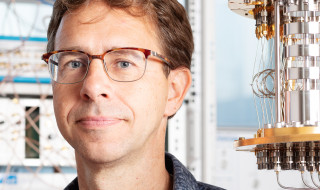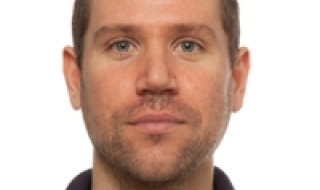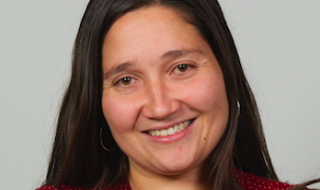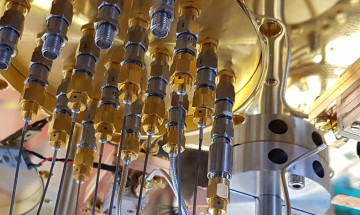"Imagine having a computer that doubles in computing power with every bit you add. With an ordinary computer, you can't imagine doing so."
Quantum computing for research: the state of play
A lot has been written about quantum computers in recent years, but where do we currently stand in the world of quantum computing for scientific research? We asked 3 experts for their opinions.
SURF keeps a close eye on developments related to quantum computing. Not with the ambition to develop such a device itself, rather to be able to assess the impact of quantum computing on our services and users. In other words, how do we make this complex matter accessible to our target groups? How do we ensure that we and our users are ready to exploit the benefits of this technology as soon as it becomes available? And how do we create an environment in which researchers can experiment and learn?
Only with the help of many partners and SURF members can we optimally prepare ourselves for this new and exciting era. We asked Vedran Dunjko (Leiden Institute of Advanced Computer Science) and Richard Versluis (QuTech) how they view the current state of quantum computing and the collaboration with SURF. We also let consultant Ariana Torres Knoop shed some light on SURF’s interest in quantum technology.
How do you explain quantum computing to someone who has never heard about it?
Ariana: “Quantum computers do not work like classical computers. They are not supposed to solve the same problems. We probably will never open our emails or write documents with a quantum computer. I always use the example of an address book to try to get people to think how the same problem can be tackled in a completely different way using a quantum computer. If we ask a classical computer for the address associated to a given name, the computer will search one name at a time."
"A quantum computer can use its quantum properties to, for example, create a state where it ‘knows’ all the names and associated addresses at once. So, instead of going through one name at the time, you can ‘manipulate’ the whole address book at once, such that when you open it, the answer you are looking for is at the top. For example, apply an operation that moves all the names starting with a given letter to the top. Then, apply a second operation that moves the ones with a given second letter even closer to the top, and so on. After a couple of operations you know the name you are looking for is at the very top of your address book. The only thing left is for you to open the address book.”
Richard: “Imagine you have a computer with which you double the computing power with every bit you add. With an ordinary computer, you can't imagine doing so. With a quantum computer it actually happens with every qubit you add. A qubit can be seen as a quantum mechanical version of a classical data bit. Quantum technology is still in its infancy. No one knows exactly what full-scale quantum computers will look like. At QuTech we develop quantum computers to show the world that it is possible. We define the requirements and the way it is made. Such prototypes can be further developed by companies in due time.”
Vedran: “We know that at an atomic level, physical systems evolve and behave very differently than our everyday observations and expectations. It just so happens that these quantum effects can be used to do certain types of computations differently, and in some cases much, much faster. The idea behind quantum computing is to really think at the level of the quantum effects. To find out how these effects can help us process information in new and interesting ways. What we are doing in my field, is coming up with schemes, algorithms, and methods to solve various types of problems, using these quantum effects in a significantly more efficient way than is possible on conventional computers.”
Where exactly are we right now?
Vedran: “If you google ‘quantum computing’, you will come across pictures of actual devices, made by large companies and institutes. You can actually run algorithms on some of these machines. However, they are still a long way from the type of quantum computers we would like to have in the future. We are still limited in the number of qubits and thus the amount of information we can process and in the duration of the computations. Also, the operations are quite ‘noisy’. The last few years, a significant chunk of the community is undertaking the challenge of coming up with interesting applications for the devices that we have and for the devices that we are likely to have in the next 5 to 10 years. We are still in the transition from theory to experiment, though. That’s why all of our work is done via simulations, running on classical machines. In the meantime, we try to build a strong curriculum for quantum computing. In fact, at the moment we have about 6 courses in Leiden, 2 of which I teach myself.”
Richard: “We have two quantum computers online; one with two qubits and one with five. These are now available to the outside world. There are different technologies to create these qubits. At QuTech, we focus on four different types of qubits. The quantum computers we have online are based on electron spin qubits and superconducting qubits. Superconducting qubits are much larger and therefore easier to make. Companies like Google and IBM are already at 50 or more qubits, but I expect that we can quickly scale up to 20 or maybe 25. The printed circuit boards with the qubit chips are cooled to a few tens of millikelvin via an advanced refrigerator, because it is only at those low temperatures that they start to behave like qubits. We need dozens of coax cables connected to the chips in order to send (analogue) microwave signals to the qubits. The frequency, phase and amplitude modulation of these pulses define the qubit operations. At the moment, our biggest challenge is to make the qubits reproducible, so that they always behave in the same manner and you always reach the same quality.”
How and why is SURF involved?
Ariana: “At SURF, we would like to support our users make the transition toward quantum computing in the future. From the researchers that use our HPC facilities, machine learning and chemistry make up the biggest pool of users. If there is a possibility of them migrating to quantum computing, we should be ready and so should they. We want to have the right set of tools in place to point them in the right direction and get the required experience. Of course, we are also interested in adopting the quantum community as users of next generation computing facilities. In order to do this, we need to figure out with them what they need, what we can offer and where we can meet. This obviously requires that we get involved in different projects, initiatives, meetings and conferences. We need to hear the community to figure out what our role is or could be now and in the future. In general, SURF wants to help in the quantum computing efforts and see where this leads. We really think there are exciting things ahead that could benefit the Dutch research community.”
Richard: “SURF provides a good network of researchers who use traditional computing power. When quantum computers improve a little more, demand will arise from this group. For example, the quantum simulator developed at Delft University of Technology is now running on the national supercomputer Cartesius at SURF. Combined with the first quantum hardware, it allows people without a quantum computing background to get used to the technology. On a personal level, I am also convinced that a good Dutch quantum computer, beneficial to the Dutch or European economy, will not be managed by a single university. We better search for an independent party that distributes the computing capacity fairly. Moreover, I think that the first quantum computers should form a tandem with existing supercomputers. By running bits of certain algorithms on both platforms, for example. It might also be useful if those systems are physically placed next to each other to minimize any latency between the computations. Anyway, this is all a pie in the sky, for now.”
Vedran: “We at Leiden have multiple objectives. Some of them are related to science, but we also want to the Netherlands to become ‘quantum ready’. It is about valorisation and contributing, giving something back to society. For instance, by making our narrow field of expertise more accessible so that people in other domains can benefit from quantum computing. SURF is definitely putting a lot of effort in that direction. By working together, we want to make sure that the academic sector has access to all the infrastructure and information they need, as painlessly as possible. Researchers like myself, who come from a theoretical background, are often lacking the insight in how particular problems could be interesting for the whole community. SURF is very good in recognising the benefits for a much broader group of users. They will know what hardware, tools and support are required. Also, I don’t think quantum computers will ever replace classic computers. In fact, we need traditional compute power and resources to stabilise whatever is happening in this weird and mysterious black quantum box. We should focus on hybrid architectures. Again, this is one of SURF's strong points. For Leiden University, the Leiden Institute of Advanced Computer Science, aQa (the applied quantum algorithms initiative in Leiden), and other teams, collaboration is key. We already do so with SURF, TNO, QuSoft and QuTech, the universities of Nijmegen and Amsterdam. We are talking with everybody. And this goes beyond the Netherlands, as well.”
"We would like to support our users make the transition toward quantum computing in the future."
Chemistry and machine learning are the killer applications for quantum computing. Why is that?
Ariana: “In machine learning you often encounter problems with many parameters and many possible solutions; the problem space is large and complex and navigating towards the solution can be very (computationally) time consuming. The properties of quantum computers can be exploited for this type of problems in a way that we expect to find better and faster methods to solve them. Think of the address book example again, the same problem but a completely different way of tackling it. For chemistry the reason is slightly different. Nowadays, solving quantum chemistry problems is very time consuming because we are trying to reproduce the quantum properties of the atoms and electrons in a classical computer. Now that we have found a computer that already works like molecules, we can just map our quantum chemistry problem into the quantum computer and let it take care of this.”
Vedran: “Given a supercomputer has enough power, we can simulate any physical system. But, when you start putting realistic numbers to how many bits or how much time we need to do so, it becomes completely impossible. Even for very small quantum computations. A simulation of just fifty to sixty qubit computations may be done in year or in ten thousand years. A quantum computing person is not worried about that, because on a quantum computer it takes less than seconds. Once you get to 100 qubits, there are very few people who believe you will ever be able to simulate this reliably on a supercomputer, yet it would be really useful for researching chemistry. With machine learning, this holds a lot of promises as quantum models may be remarkably powerful. We are still looking for the ultimate use, though. We have to do a lot of experimenting with larger datasets. Unfortunately, we don’t have large enough devices to do that type of exploration, yet, but we are developing work-arounds.”
When will quantum computing be widely accessible for the research community in the Netherlands?
Ariana: “There are already some real quantum computers at Google, IBM and also for example QuTech, but they are not as powerful as we would like them to be. Any time soon, the first ‘useful’ calculations can be performed on those systems. Useful in terms of quantum algorithms that are executed somewhat faster than on regular classical supercomputers. In the last couple of years, the quantum knowledge and technology has grown exponentially fast. Much faster than with normal computing in its early years. This is very encouraging. A lot still needs to be done before we can run applications that will never be possible on classical supercomputers. This requires major technology developments in the next 5 to 10 years, trying to get thousands and even hundreds of thousands of useful qubits, as well as developments of quantum algorithms and quantum applications.”
Richard: “QuTech is an independent party and we want our knowledge to become available for research and business. This is different with Google and IBM. They are mainly interested in selling new products and we do not want to compete with that. If we confine ourselves to the scientific world in the Netherlands, I think that in 2 or 3 years' time we will be able to make good use of the quantum computers and make them available to a broad target group, but purely as research objects: how do these computers behave? How can we improve them? The question of when quantum computers will be ready for meaningful purposes, is a lot more difficult to answer. Then we are really talking about the economic value of quantum technology. I think, and this is an educated guess, that researchers will use the added value of a quantum computer between 3 and 7 years from now. Commercially viable systems, with added value for companies, will probably take at least 10 years to come to full maturity.”
Vedran: “We are in an exciting phase. We are already using quantum computers in certain domains for very specific applications, in quantum simulations. If you are talking about proper quantum computing and running algorithms, the story is still a bit different. Google did an experiment last year, with remarkable results. But we are not at the next step, yet. There is still a humongous gap in our understanding of how to use these devices and what the actual physical processes are doing. All this is slowing us down in coming up with useful applications. To think we will reach all our goals for quantum computing in 5 years is too optimistic. I do hope we will have one or two examples of truly useful quantum computation ready by then. In quantum computing we are taking the scientific approach and being systematic. We do not just aim for the final result or have one objective, we are trying to learn about devices, physics and computer science along the way. Learning about the world takes time. And patience.”
"A simulation of just 50 to 60 qubit computations may be done in year or in ten thousand years. A quantum computing person is not worried about that, because on a quantum computer it takes less than seconds."
The quantum computing era is beckoning on the horizon, with great future potential for applications in science and business. Currently, large investments are being made worldwide as well as in the Netherlands for the development of technology and applications. The Netherlands is well-positioned, with investments and nation-wide collaboration through the National Agenda Quantum Technology (NAQT) and a strong national ecosystem (Quantum Delta). Only through strong collaboration among research and technology development, algorithm development, application domains, service providers, business and education, will we be able to take full advantage of quantum technology.
Learn more
Useful videos with accessible information about quantum computing:
Richard Versluis - QuTech

QuTech is the advanced research center for Quantum Computing and Quantum Internet, a collaboration founded in 2014 by Delft University of Technology (TU Delft) and the Netherlands Organisation for Applied Scientific Research (TNO). Richard Versluis is principal systems engineer at TNO and system architect of Quantum Inspire, the world’s first full-stack prototype quantum computer in the cloud supporting multiple qubit technologies among which the world’s first spin-based quantum processor in the cloud.
Vedran Dunjko – Universiteit Leiden (LIACS)

Vedran received his MSc degree in Mathematics and Computer Science from the University of Zagreb, and has completed his PhD in 2012 in Theoretical Physics at Heriot-Watt University, Edinburgh, working on new quantum cryptographic protocols. After his PhD, he has held post-doctoral positions at the School of Informatics of the University of Edinburgh, Institute of Theoretical Physics of Innsbruck University, and the Theory Group of Max Planck Institute of Quantum Optics in Germany. Since 2013, his research has focused on various aspects of quantum machine learning including the development of novel quantum algorithms for machine learning and AI problems, and the application of AI methods in quantum contexts. Vedran joined LIACS as a tenure-track Assistant Professor in 2018. LIACS (Leiden Institute of Advanced Computer Science) is a centre of excellence for multidisciplinary research and education in computer science and artificial intelligence (AI), collaborating closely with aQa team members Eleanor Scerri (Postdoctoral Researcher, LION) and Thomas O’Brien (Assistant Professor, LION).
Ariana Torres Knoop - SURF

Ariana is advisor at SURF. She did her bachelor in physics in Mexico, after which she pursued a master degree in Physics and Material Science in a joint program between the ENS-Lyon and the University of Amsterdam. In 2016 she finished her PhD (cum laude) in the Computational Chemistry group at the University of Amsterdam and worked after as a Postdoc in the Polymer Chemistry group in the same university. She joined SURF about 2 years ago to help with the quantum computing projects. Within SURF, she is being supported by Axel Berg (Manager SURF Open Innovation Lab), Damian Podareanu (Consultant for machine learning, high performance and quantum computing) on quantum related research topics.
